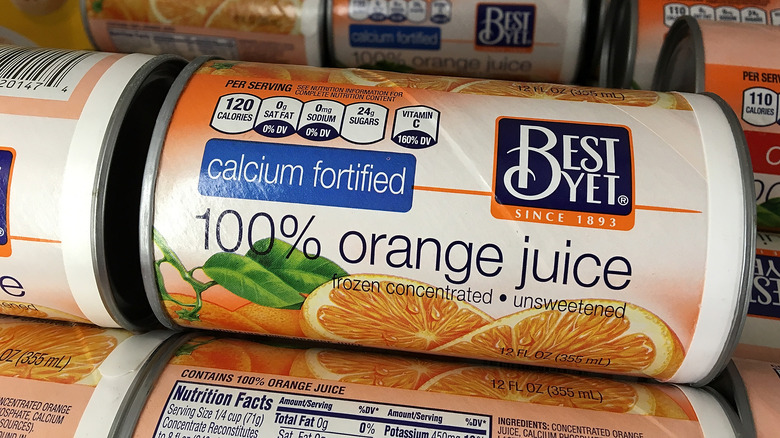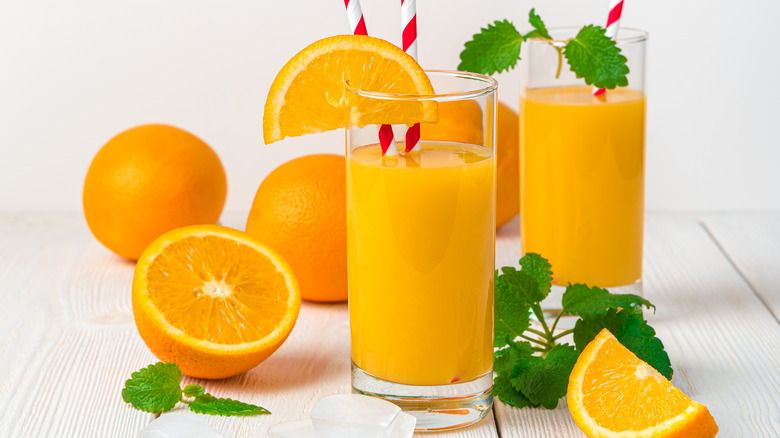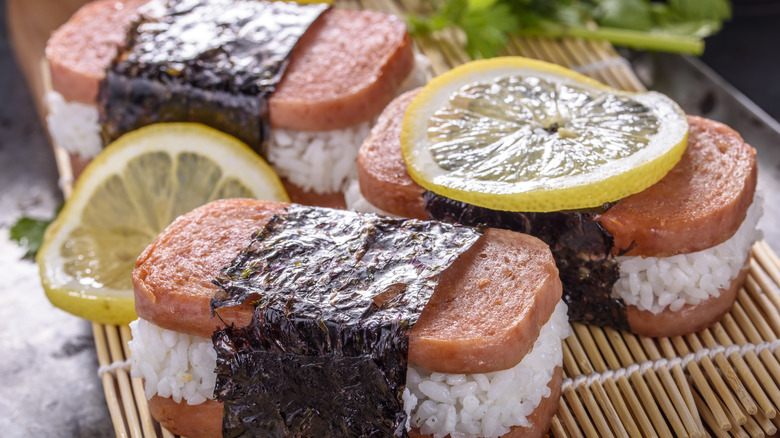Frozen Orange Juice Concentrate Was Originally A Wartime Necessity
If you're reaching for a drink to start your day, chances are you're either reaching for coffee or orange juice. Nearly every breakfast commercial proves it, featuring a glass of freshly squeezed juice right next to the cereal or eggs and bacon. However, while the fresh stuff may be standard now, for several decades, that wasn't the case.
If you grew up in the '90s or earlier, you're almost certainly familiar with frozen orange juice concentrate, those Pillsbury-esque little tubes of Minute Maid or Old Orchard filled with an odd, sugary, orange substance. It's possible your family used them to the exclusion of all else. And there's good reason for that: Your grandparents likely grew up on the stuff, because it absolutely took off in the years following the Second World War. As with seemingly all foods that got their start (or gained popularity) during the early-to-mid 1940s, the reason why has to do with the realities of wartime logistics.
Orange juice concentrate was created to help soldiers
During World War II, the U.S. military had to solve the problem of getting all sorts of necessary nutrients to its soldiers. Vitamin C, crucial in the prevention of scurvy — per Cleveland Clinic – was one of the more important ones, and oranges are loaded with the stuff. But the logistics of this presented an obvious problem. Straight-up freezing orange juice didn't work — it still spoiled in transit.
The solution was simple, and thanks to an 1897 invention, there was a ready-made answer: condensing. Just before the turn of the 20th century, Dr. John T. Dorrance of the Campbell's Soup Company had figured out how to create a condensed soup that could be reconstituted simply by adding water. After some experimentation, U.S.D.A. scientists applied a similar process to orange juice: They evaporated the liquid in a vacuum at low temperatures, then added just a bit of fresh juice to the resulting mass to help it keep its taste. This wasn't perfect, but boom: ready-made orange juice, just add water!
Despite the success, orange juice concentrate couldn't be produced in time before the end of the war. But the developers realized they could sell frozen orange juice concentrate to the public. They eventually named their new company Minute Maid and, thanks to an endorsement partnership with Bing Crosby, the stuff truly took off starting in 1949.
Other foods were also a result of wartime necessity
This same process — the government creating a product to ship to soldiers in the field, then finding out it had more widespread applications — actually repeated itself several times during the 1940s. Searching for a way to get cheese to its servicemen, the military funded research into the creation of a form of dehydrated cheese powder that could be easily packed into rations. After the war, the army had a surplus of powdered cheese, so they sold it to the Frito Company. You might be able to guess where this is headed: This is where Cheetos came from.
Then, there are products that were technically not created for WWII, but which likely wouldn't still exist without it. The best example here is spam. The stuff was introduced to the market in 1937 and, while it was available on store shelves in the late 1930s, it didn't become an integral part of the American diet until the war; the military had great use for a meat source that didn't quickly spoil, was easily transportable, and cost little to acquire. A ubiquitous part of a soldier's diet during that conflict, spam's popularity endured after the war — particularly in Hawaii, where the huge quantities available have made it an integral part of dishes such as spam musubi.


